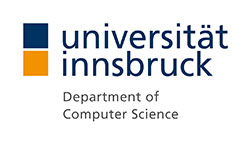Spreading excellence and disseminating the cutting edge results of our research and development efforts is crucial to our institute. Check for our educational offers for Bachelor, Master and PhD studies at the University of Innsbruck!
Game-based multimedia interlinking
Many tasks in semantic content creation, from building and aligning vocabularies to annotation or data interlinking, still require human intervention. Even though automatic methods addressing the before mentioned challenges have reached a certain level of maturity user input is still required at many ends of these processes. The idea of human computation is to rely on the human user for problems that are impossible to solve for computers. However, users need clear incentives in order to dedicate their time and manual labor to tasks. One way to achieve this is by cleverly hiding most of a complex task behind a game. Games, if implemented properly contain the implicit motivation for people to keep playing. Consequently people dedicate their spare time voluntarily to generate huge sets of data. The OntoGame series intends to exploit this. In this thesis we continue the OntoGame series of games and apply the approach of using games for knowledge acquisition to concepts of multimedia interlinking, aiming at game based interlinking. We show that the majority of interlinking methods require human contribution and describe how game-based interlinking can be achieved. As a proof-of-concept we have implemented the SeaFish game. SeaFish is a game for collaborative image annotation and interlinking without text. In this latest release of the OntoGame series, players have to select images that are related to a concept that is represented by an image (from DBpedia) from a collection of images (produced by querying flickrTMwrappr with the respective concept). The data collected by SeaFish is published as Linked Open Data on the Web. Finally, we present the results of the evaluation of SeaFish and summarize our findings.
Contact person in charge.

